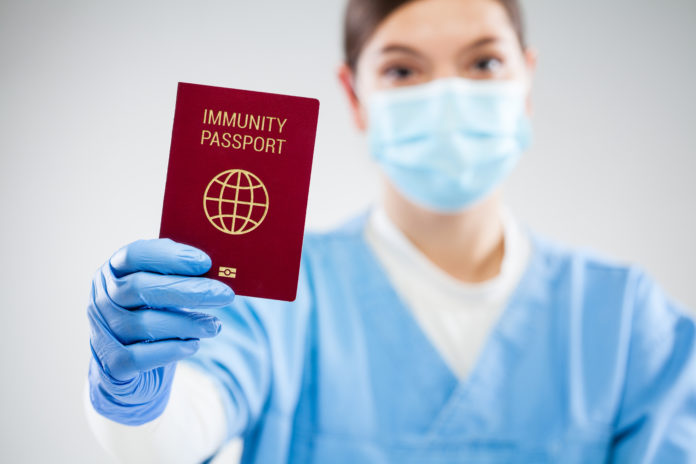The so-called “immunity passport,” being proposed by some as a type of identification and documentation of immunity to a disease, presents numerous problems, both scientific and civic. The very idea violates long-treasured notions of privacy and freedom and is based on shaky scientific evidence.
According to The Lancet, immunity to diseases such as COVID-19 could be “proven” through a laboratory test which shows that a person has developed an immune response through an “immunizing event,” meaning infection or vaccination. But, as The Lancet points out, there are important immunological problems that undermine the medical reliability of such tests. For one, the duration of the immunity remains essentially a mystery. The World Health Organization has stated it doesn’t know the level of protection that COVID-19 antibodies provide against reinfection, nor how long such protection might last. In addition, there are ongoing, important questions about the efficacy of COVID-19 antibody tests, many of which are producing controversial and inconsistent results.
Given this and other unanswered questions, The Lancet deems immunity passports unfeasible based on the lack of reliable scientific evidence.
But beyond the scientific arguments, there are serious civil liberties concerns for all Americans stemming from this proposal. For example, these proposed “passports” would allow certain people who test positive for COVID-19 antibodies to return to work before others. Some citizens may remain ineligible to be employed because they don’t have the immunity passport. There is also the real risk that employers will prefer to hire those with immunity rather than devoting resources to safety precautions that protect all employees. The impact of such a scheme would also fall disproportionately on industries in which employees cannot work from home, including health care, food production and food service, transportation, caregiving, and distribution, to name just a few.
In Constitutional terms, the very idea of an immunity passport massively undermines basic freedoms to move about freely without having to present a “permission slip.” To restrict entry to a grocery store, concert, sports arena, subway or even workplace is to deprive citizens of participation in normal civic life. In a country where “papers” must be shown, we have arrived at the antithesis of freedom.
Natalie Kolfer and Francoise Baylis, authors for nature.com, wrote an article titled, “The ten reasons why immunity passports are a bad idea.” They detail new forms of discrimination that could easily expand to other forms of personal health data, such as mental health records and genetic test results. There is a very real risk that these would introduce reasons for discrimination if employers, insurance companies, law enforcement officers and others could access private health information. People who are not regularly vaccinated or tested could be targeted as a danger to others, and their permission to participate in normal civic life could be revoked. Citizenship would become provisional.
Big Brother Watch, a civil liberties and privacy organization based in the United Kingdom, concluded, “the cost of Covid-status certificates (immunity passports) to civil liberties, let alone economically, socially and politically, can hardly be explained, let justified.”
People may believe that the immunity passport is a small price to pay for certain practical freedoms, but it is a dangerous bargain that requires us to sell our freedoms. Today, it’s COVID-19, but tomorrow it could be any illness.
For once, freedom-loving people can agree with the far-left-leaning American Civil Liberties Union, which voices serious concerns about the adoption of an immunity passport and urges that “no significant policy decisions should currently be made on the basis of presumed immunity.”

